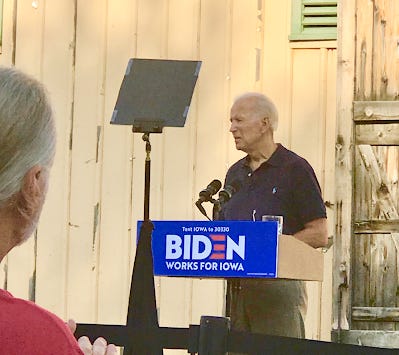Jimmy Carter was a good man at a bad time to be president.
He was a "post-Watergate" president.
Jimmy Carter made politics a job of public service. Americans wanted that, at least for a while.
Jimmy Carter was elected president after Nixon resigned in the aftermath of "Watergate." Carter taught Sunday school, which at first was an electoral positive for him. He was a southerner who spoke for progress on integration and women's equality. He and Rosalynn were devoted to each other, and he kept his small-town plain-folks vibe throughout his life. It was genuine.
I ran for office in 1980 because politics seemed like an honorable profession, a way to change the world for the better. Reporters -- then also a respected profession -- acted as the public's watchdog. That system seemed to work. There was a good-government reform feeling in the air. Women were getting equal rights, even if not the Constitutional amendment they sought. Jimmy Carter was part of that post-Watergate thinking.
Carter inherited a mess and it got worse over the four years of his term. People were frustrated by "stagflation"; the high interest rates that Carter let get higher to try to stop inflation; the collapse of the housing market amid sky-high mortgage rates; gasoline shortages and lines at gas stations, and in the election year of 1980 the Iran hostage crisis. Carter said there was no magic wand for a quick fix. And there wasn't. Until the technology of oil production changed, the problem of our dependence on foreign oil was caused by our consumption. We needed to lower our thermostats and wear a sweater in the house in the winter. Drive 55 miles per hour. Economize. Conserve. Be our best selves. Americans didn't like it. Less isn't more. It is less. The late 1970s felt like hard times.
Jimmy Carter sold his peanut farm, put assets into a blind trust, and kept his influence-peddling, beer-drinking brother, Billy, at arms length. He tried to put a stop to revolving-door influence peddling that was and is D.C. culture. That did not win friends in Congress, which saw it as shaming them. Jimmy Carter wasn't a schmoozer, not with Congress. A college near-classmate, James Fallows, who worked on the speechwriting team, wrote that Carter personally kept the schedule for staff to use the White House tennis courts. It described a micro-manager and that is how that was understood. It also described a person punctilious about fairness and privilege.
There is an idea in the zeitgeist during this Trump era that presidents need not be people of good character, and maybe should not be. Personal virtue is the realm of spiritual leaders, not political ones. Jesus never led an army. Machiavelli, not Jesus, understood leadership. God uses bad people to fulfill His plan. Leaders need to be bold and selfish, a bad-ass, to deal in a world of bad-asses. The Trump era is the opposite of the post-Watergate era.
Back in 1980 I considered Carter unfortunate, more a victim than a failure. We have had 45 years to evaluate his presidency, and he stands up pretty well. He did courageous, necessary things. Amid controversy, he deregulated the airlines and trucking industries, unleashing a huge increase in productivity. He initiated the high interest rate policies that ended the inflation cycle, something that Reagan gets credit for. He ended the hostage crisis, the handoff taking place in the first hour of Reagan's presidency.
History has been kind to Carter. He is remembered for his good deeds post-presidency.
Carter offers an uncomfortable lesson to Democrats, one that cuts against the grain of their century-long project of creating a kinder, more inclusive social welfare polity. Democratic policy leaders on Congressional staffs and advocacy groups consider themselves to be fighting for social justice. They are the "good guys" pushing against the selfish billionaires, the powerful, the corporations, and the privileged. Democrats inevitably encounter inertia and reluctance to change from people -- a majority or more of the public -- who like what they have and resist change. A great many Americans presume that if they are being asked to sacrifice for the environment, for other countries, for other people here in America, or for some high-minded aspiration, that they are being cheated in some way. They are quick to feel scolded if they defend themselves and their mindset. They would rather be cheated by a corrupt politician who says he is on their side than by people who appear to disapprove of them.
I like Jimmy Carter, but he is a cautionary note to Democrats about Sunday school.

















